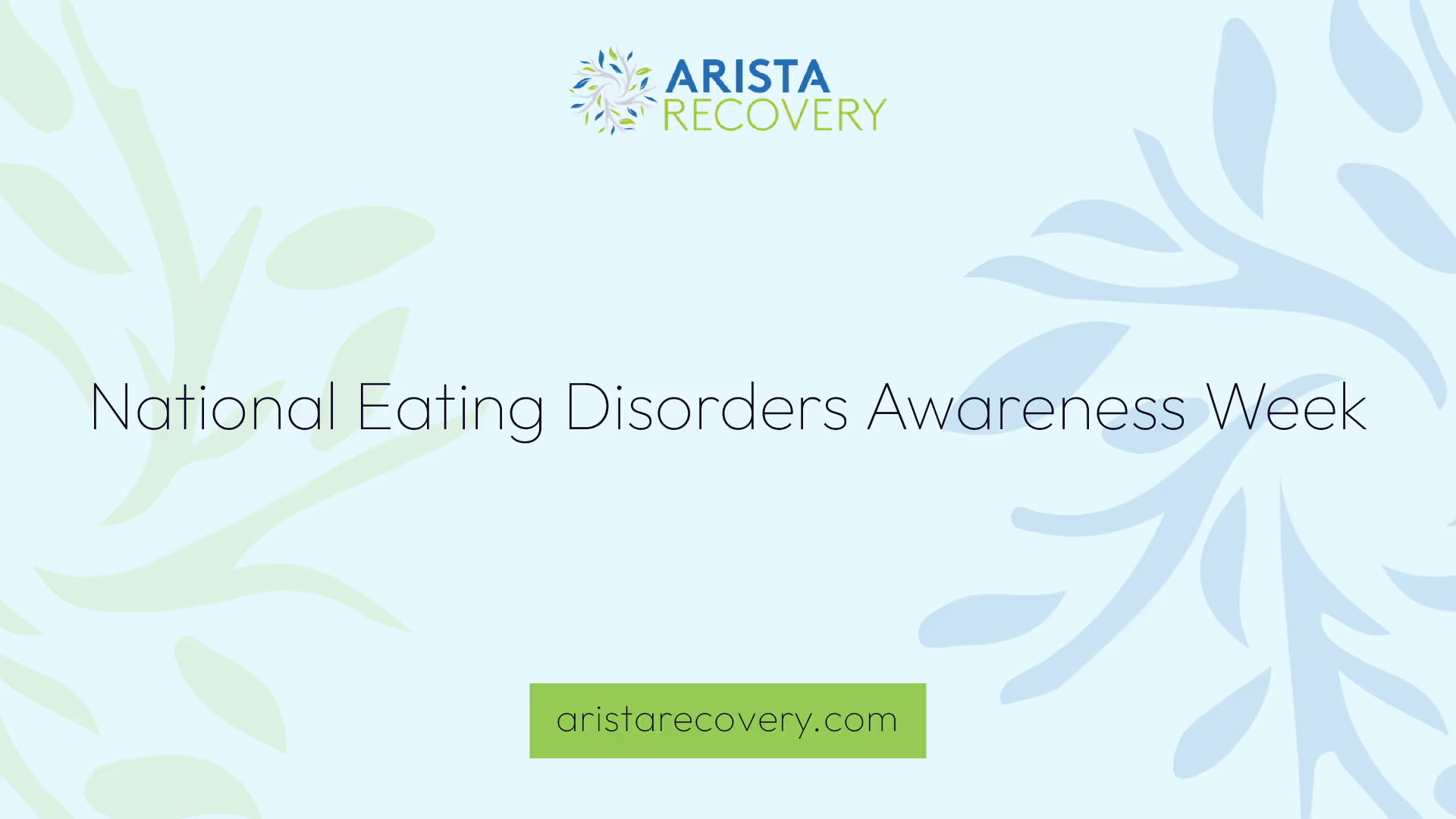
National Eating Disorders Awareness Week
Understanding Eating Disorders
Eating disorders are complex mental health conditions that can have serious physical and psychological consequences. In this section, we'll provide a brief overview of eating disorders and delve into their impact on individuals.

Overview of Eating Disorders
Eating disorders are characterized by abnormal or disturbed eating habits that negatively affect a person's health, emotions, and ability to function in important areas of life. These disorders often involve intense preoccupations with food, body weight, and shape.
Several types of eating disorders exist, including anorexia nervosa, bulimia nervosa, and binge-eating disorder. Each of these conditions has unique symptoms and effects, but all are serious and potentially life-threatening if not properly addressed.
Despite the severity of these conditions, it's important to recognize that recovery from eating disorders is possible with appropriate treatment and support. This fact underscores the purpose of initiatives like the National Eating Disorders Awareness Week, aimed at raising awareness and promoting understanding of these conditions.
Impact of Eating Disorders
The effects of eating disorders extend beyond the individual and can have profound implications on physical health, mental well-being, and overall quality of life.
Physically, eating disorders can lead to a range of health complications. These include cardiovascular disease, oral health problems, gastrointestinal issues, seizures, and brain damage. Other health problems linked with eating disorders are sleep issues, bone and muscle loss, and negative impacts on reproductive and maternal health outcomes.
On a psychological level, eating disorders are associated with higher rates of anxiety, depression, and mood disorders. These mental health complications further emphasize the need for comprehensive care and treatment for those suffering from eating disorders.
These impacts highlight the importance of increased awareness, understanding, and resources to support those affected by eating disorders, a mission central to the National Eating Disorders Awareness Week.
National Eating Disorders Awareness Week
In an effort to shed light on an issue that affects millions of people around the globe, every year an important event takes place: the National Eating Disorders Awareness Week.
Purpose of NEDAW
National Eating Disorders Awareness Week (NEDAW) is an annual event in the United States that aims to increase awareness of eating disorders, their impacts, disparities, resources, and treatment options. This initiative is part of a larger effort to enhance the public understanding of eating disorders, their causes, dangers, treatments, and promote prevention efforts [1].
The National Eating Disorders Association (NEDA) participates actively in this annual campaign to raise awareness about eating disorders [2]. The main objective is to educate the public and provide support to individuals and families affected by these illnesses. The week-long event serves as an opportunity to spotlight the seriousness of eating disorders and the dire need for additional resources, research, and early intervention.
Theme for NEDAW
Each year, the NEDAW carries a central theme to guide the awareness efforts. The theme for the Eating Disorders Awareness Week 2024 is slated to focus on educating the public about eating disorders and providing support to individuals and families affected by these illnesses. The event for this year is scheduled to take place from Monday, February 26 to Sunday, March 3, 2024 [3].
The theme often reflects the current issues and challenges faced in the field of eating disorders, and is used to create targeted messages that resonate with a wide audience. It serves as a unifying factor that brings together diverse stakeholders, including individuals affected by eating disorders, their families, healthcare professionals, policy-makers, and the general public.
Through this week of awareness, NEDAW continues to play a crucial role in the fight against eating disorders, highlighting the importance of education, early intervention, and the provision of effective treatment options to those in need.
Resources and Support
Support and resources are crucial components in the journey towards understanding and addressing eating disorders. The National Eating Disorders Association (NEDA) and various crisis helplines and screening tools offer valuable assistance to those affected by eating disorders.
National Eating Disorders Association (NEDA)
The National Eating Disorders Association (NEDA) is a significant player in the fight against eating disorders. They participate in the National Eating Disorders Awareness Week, an annual campaign aimed at raising awareness about eating disorders [2].
In addition to raising awareness, NEDA also provides a range of resources to support those affected by eating disorders. One such resource is a confidential screening tool for individuals who are concerned about struggling with an eating disorder.
Moreover, NEDA offers resources to help individuals locate eating disorder treatment providers in their area or online.
Crisis Helplines and Screening Tools
Crisis helplines and screening tools offer immediate support and assistance to individuals in distress. In times of crisis, individuals can reach out to the Suicide and Crisis Lifeline by calling or texting 988. They can also use the Crisis Text Line by texting "HOME" to 741-741.
NEDA also provides a Helpline for individuals looking to speak with someone about eating disorder concerns for themselves or their loved ones.
These resources and support systems offer a lifeline to those affected by eating disorders, providing support, guidance, and assistance when it's most needed. They play a crucial role in the overarching goal of the National Eating Disorders Awareness Week, which is to shed light on eating disorders and provide the necessary resources for those affected.
Health Implications of Eating Disorders
Understanding the health implications of eating disorders is key to comprehending the severity of these conditions. These disorders affect both physical and mental health, often in profound ways.
Physical Health Effects
Eating disorders can harm the body in various ways. They can lead to serious health issues, including cardiovascular disease, oral health problems, gastrointestinal issues, seizures, and brain damage. Sleep issues are also common among individuals with eating disorders.
Moreover, these disorders can lead to significant bone and muscle loss due to inadequate nutrition. This puts certain demographics, like athletes and older adults, at a higher risk of experiencing bone fractures, muscle injuries, and sarcopenia, a condition characterized by loss of muscle mass and strength.
Eating disorders can also negatively impact reproductive and maternal health outcomes. Complications can range from miscarriage and low birthweight to difficulties during pregnancy and postpartum depression.
These physical health effects underscore the importance of early diagnosis and treatment. With the right support, individuals can fully recover from eating disorders Women's Health.
Mental Health Effects
Eating disorders also have a significant impact on mental health. They are often associated with conditions like anxiety, depression, and other mood disorders. The mental strain caused by eating disorders can exacerbate these conditions, making it even more challenging for individuals to cope.
The relationship between eating disorders and mental health is complex and bidirectional. Mental health issues can both contribute to the development of eating disorders and be a result of them. This underscores the importance of a comprehensive treatment approach that addresses both the physical and mental health effects of eating disorders.
Continued awareness initiatives like National Eating Disorders Awareness Week are crucial in informing the public about the severe health implications of eating disorders. They also emphasize the importance of early intervention and the availability of resources for those affected by these conditions.
Risk Factors and Prevention
Understanding the risk factors associated with eating disorders is a critical step towards prevention. These risk factors encompass biological, psychological, social, and environmental elements, each contributing to the development and perpetuation of these disorders.
Biological and Psychological Factors
Biological and psychological influences play a significant role in the onset of eating disorders. These factors include a family history of eating disorders, indicating a genetic predisposition, and certain personality traits such as perfectionism.
Dieting and restrictive eating can also act as triggers, especially when paired with body dissatisfaction. Body dissatisfaction often stems from negative self-perception and can be magnified by weight stigma or bullying. It's important to remember, however, that not everyone with these risk factors will develop an eating disorder, and not everyone with an eating disorder has associated risk factors [1].
Social and Environmental Influences
Social and environmental factors further compound the risk of developing eating disorders. These influences include cultural pressures that glorify thinness and stigmatize larger body sizes, contributing to body dissatisfaction.
Exposure to trauma can also act as a risk factor, as individuals may turn to disordered eating behaviors as a coping mechanism. Similarly, societal pressures around appearance and diet can create an environment conducive to the development of eating disorders.
The impact of these risk factors varies among individuals, and their presence does not guarantee the development of an eating disorder. Conversely, the absence of these risk factors does not make an individual immune to eating disorders [4].
Prevention efforts during the National Eating Disorders Awareness Week and beyond should focus on addressing these risk factors. This includes promoting positive body image, challenging cultural and societal pressures around appearance, and providing support for individuals struggling with body dissatisfaction and other psychological challenges. By creating a supportive and accepting environment, we can contribute to the reduction of eating disorders in society.
Advocacy and Awareness Initiatives
In the fight against eating disorders, several initiatives aim to raise awareness and provide support for those affected. These efforts are crucial in promoting understanding, reducing stigma, and encouraging recovery. This section will highlight two such programs: NEDA Walks and Campus Warriors, and The Body Project and Awareness Campaigns.
NEDA Walks and Campus Warriors
NEDA Walks are events hosted by the National Eating Disorders Association, with more than 40 walks taking place across the country. These events raise awareness and funds for the fight against eating disorders, encouraging individuals to join these communities of healing and hope [4].
Similarly, Campus Warriors is an initiative that collaborates with colleges and universities in the United States. This program aims to increase awareness about eating disorders, involving students, faculty members, and student organizations with lived experience in eating disorders [4].
The Body Project and Awareness Campaigns
The Body Project, supported by two decades of research and evaluation data, offers a group-based intervention that empowers women and girls to challenge unrealistic beauty standards and cultivate a healthy body image. This is achieved through various exercises designed to promote a positive self-image.
In addition to these specific programs, NEDA leads and participates in various awareness campaigns throughout the year. These campaigns strive to raise awareness for eating disorders and associated issues, showcasing a continuous effort to enlighten the public about these critical matters [4].
These initiatives, among others, are vital components of the national eating disorders awareness week and the broader efforts to combat eating disorders. They not only play a significant role in raising awareness but also provide valuable resources for those affected by these disorders.
References
[1]: https://www.womenshealth.gov/nedaw
[2]: https://www.nationaleatingdisorders.org/get-help/
[3]: https://www.nationaleatingdisorders.org/eating-disorders-awareness-week-2024/
[4]: https://www.nationaleatingdisorders.org/get-involved/
[5]: https://www.nimh.nih.gov/get-involved/digital-toolkit-for-national-eating-disorders-awareness-week
When mental health challenges and addiction intersect, it can feel isolating. At Arista, we offer compassionate, evidence-based, and trauma-informed care to help you heal, grow, and move forward.
You’re not alone in this.
When mental health challenges and addiction intersect, it can feel isolating. At Arista, we offer compassionate, evidence-based, and trauma-informed care to help you heal, grow, and move forward.
Support that moves with you.
You’ve taken a brave first step. At Arista Recovery, we’re here to help you continue with best-in-class care designed for long-term healing and support.
.webp)






